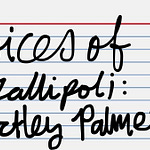Read this first, before you listen to the audio
[Voices of Gallipoli] is largely a collection of [verbatim] narratives which tell how humble and mostly simple New Zealanders lived and died on Turkey’s Gallipoli peninsula for eight months in the year of 1915.
The war veterans’ testimonies were taken and recorded by one of New Zealand’s finest writers - Maurice Shadbolt. They began as research for his play Once on Chunuk Bair. The veterans were interviewed in the early 1980s (nearly seventy years after the events, sensations and feelings they describe) but their recollections are clear, moving and valuable.
These are the men.
Tony Fagan
Henry Lewis
Hartley Palmer
Russell Weir
Dan Curham
George Skerret
Harvey Johns
Charlie Clark
John Skinner
Bill East
Joe Gasparich
Vic Nicholson
Today, the primary way to access their oral testimonies is via the book. You can buy it here (among other places online).
That’s great, but to paraphrase myself from the previous edition of Citizens of Nowhere
[Text is] first and foremost a proxy for speech.
Something special happens when oral testimonies are spoken aloud by a third party, to a group of listeners.
It’s special for the person reading - to feel the words, memories and impressions in my mouth does something to me. It feels closely related to the concept of ‘inhabiting a character’. It feels like a form of magic.
It’s special for the people hearing it. It makes the long-gone person whose words are spoken present in the space. Reading silently is wonderful in so many ways. To hear text spoken aloud brings it home in different ways that are worth experiencing collectively.
ANZAC day means something special to many New Zealanders
ANZAC day in New Zealand is a rare and precious thing: a collective public ceremony of remembrance that’s entered into in a respectful (even reverential) way by a broad cross-section of New Zealanders, all over the country.
It doesn’t need changing or improving, and certainly not by me. But I feel that there’s the potential to add to these ceremonies, or the events surrounding them, by introducing a tradition of oral recollection. I feel that those gathered would value the chance to hear the verbatim words of the people that they’re remembering.
So, I’m proposing to work with publisher David Ling and the Shadbolt Estate to get the permission to speak these words aloud in public.
Here’s how I see this working
Step 1. Voices of Gallipoli events
Public gatherings where one or more experienced readers deliver one or more testimonies
When around ANZAC day (25th April each year)
Other significant Gallipoli-related anniversaries that loom large in the oral histories are the charge across the Daisy Patch (8th May, part of Second Battle of Krithia), the Battle for Chunuk Bair (6-10 August) and the retreat from Gallipoli- perhaps the most successful part of the campaign (9 Jan)
The trick is to design things in a way that gives an equivalent weight to all the voices over the course of time and events.
To read them all in a single session would take 3 or 4 hours, which could be appropriate in some ways/circumstances, but is probably too much for a typical event if I want this to be as regular as I’m hoping
Realistically, I reckon the most satisfying way to give the stories weight would be events that involves 1-3 testimonies, plus time for a shared meal/discussion afterwards
Step 2. DIY Voices of Gallipoli
I’ll make it easy for people to access veteran testimonials and make recordings on their phones that can be shared to their social media as an act of rememberance.
The goal is that each veteran’s voice echoes down the ages via hundreds of people choosing to pay their respects every year
I’d probably run workshops with schools and community groups to make them the heart of this - and to help me figure out the simplest UX so people can self-serve online later
Step 3. Beyond Gallipoli: Voices of War
In New Zealand and around the world there are numerous oral histories taken from people who actively served in both past wars and more recent conflicts
They’re currently stored in text form in oral history archives or in family collection
Or they’re rattling round in the heads of more recent veterans
I’d like to facilitate the public reading of similar oral histories of veterans of more recent battles as a way to honor them, and - if they’re still with us - to help them to come to terms with their experiences
In the UK Remembrance Day and in the US Veterans Day ( both 11 November) serve a similar purpose to ANZAC day in NZ - they could be the perfect occasion for this neotradition
But every great journey has to start with a single voice. The audio at the top of is me reading Harvey Johns’ testimony out loud.
Have a listen.
Arthur.













Share this post